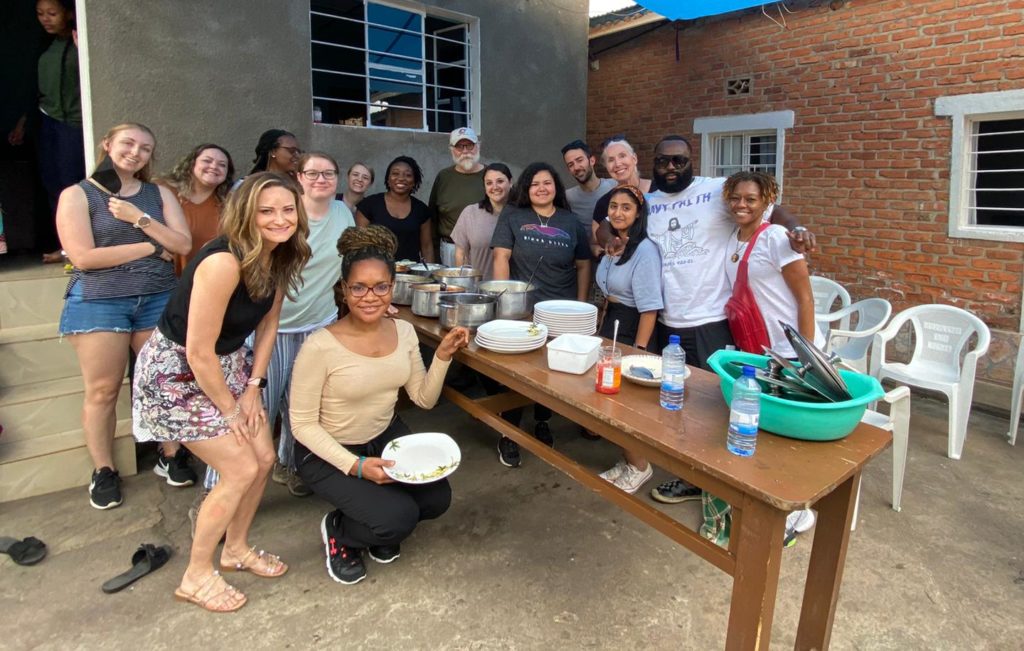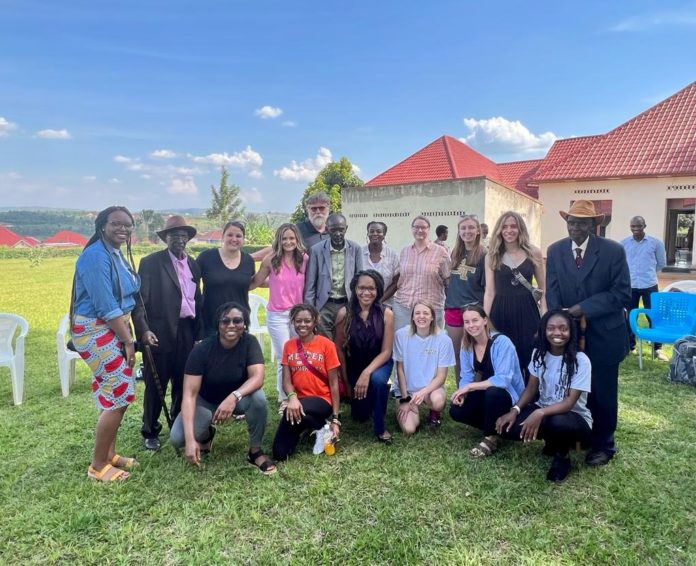
One by one, the Rwandan people shared their personal experiences from the 1994 genocide, many for the first time. The stories were difficult to tell and difficult to hear, but it was an important step in learning how to manage past trauma and help others do the same.
This summer, counseling faculty and students in Mercer’s College of Professional Advancement (COPA) traveled to Kigali, Rwanda, to train volunteers in a group treatment model of trauma therapy. Counseling professors Dr. David Lane and Dr. Brittany Prioleau, eight master’s students, and four Ph.D. students went on this new Mercer On Mission trip.
For several years, Mercer’s School of Business has led a Mercer On Mission trip to Rwanda, with the mission of teaching entrepreneurial skills to widows and orphans of the genocide. One of the School’s local partners in the project, a genocide survivors’ organization named GAERG, focuses on both economic recovery and trauma care, and the COPA team addressed needs related to the latter, Dr. Lane said.
Business and mental health are closely tied. A mentally healthy workforce is necessary for businesses to prosper, and some Rwandans participated in both the business and counseling training.
The two Mercer groups traveled to Rwanda together, lodged at the same place and teamed up for cultural activities, but they focused on their separate work during the week.
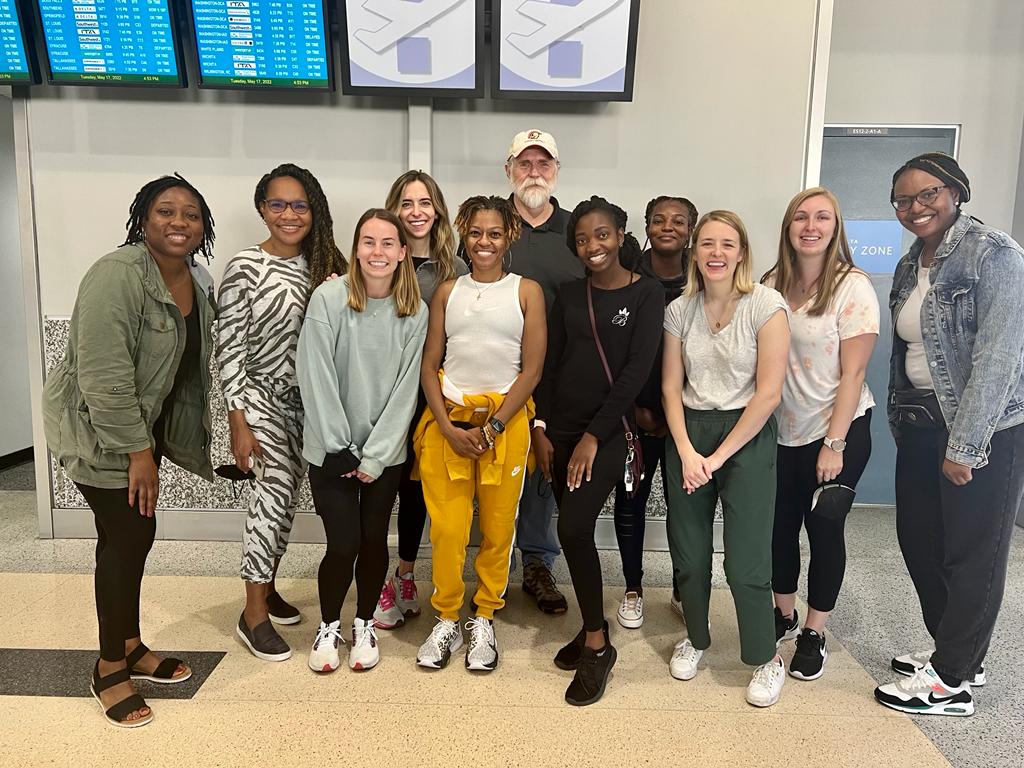
Dr. Lane specializes in trauma therapy and developed a group treatment model with his wife, COPA counseling adjunct professor Dr. Donna Lane. He used that model to train volunteers in Haiti after the 2010 earthquake and in Newtown, Connecticut, after the Sandy Hook Elementary School shooting in 2012. It has now been translated into five languages and used in more than a dozen countries, he said.
Dr. Lane’s treatment model is based on narrative therapy, which is about writing your story. He explained that traumatic experiences aren’t stored in sequence in a person’s brain like other life memories.
“They are stored in fragments and images in your brain,” he said. “Since they are not verbally put in your brain, the trauma kind of freezes your brain and nervous system into this rigid format of survival.”
Those memories of fear, helplessness and horror can be triggered by any sight, sound or smell, and the brain can’t tell whether it’s happening now or just a memory. When a person is able to put words to their trauma and integrate it into their whole life story, it becomes verbally accessible and more manageable.
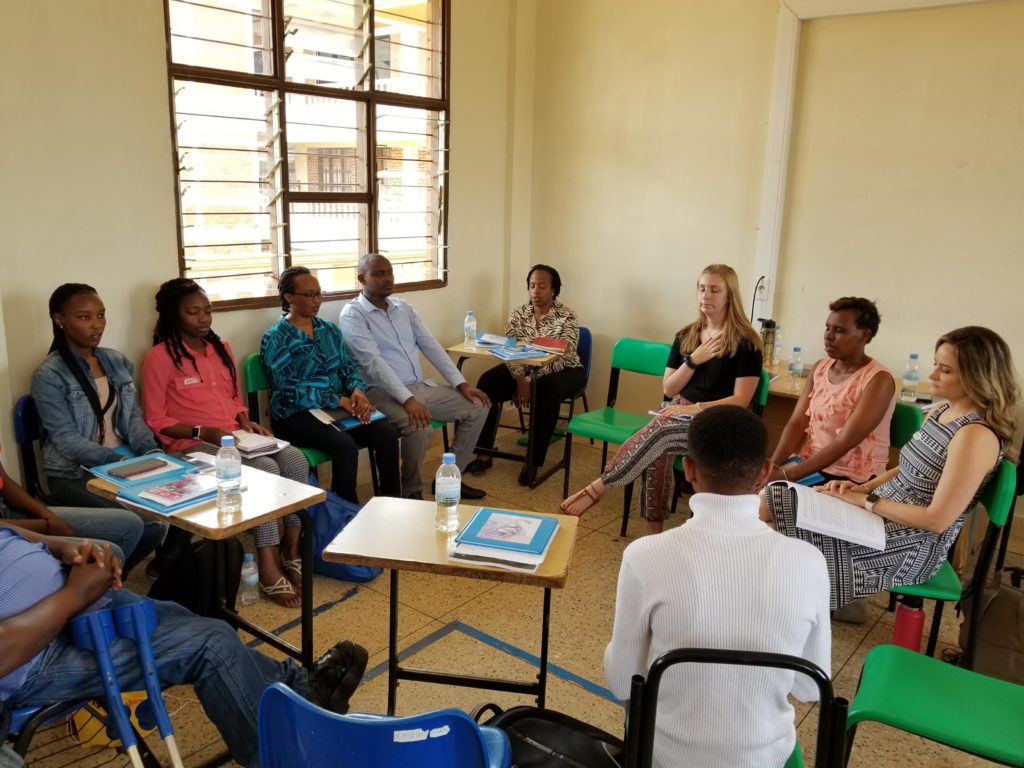
“The final piece is you get to write your story from now on. Your trauma does not define you,” Dr. Lane said.
Traumatic experiences get passed on through generations, and the whole Rwandan society suffers from collective trauma from the genocide, during which hundreds of thousands of people were killed. Many also are plagued with survivor’s guilt. And because everyone there has their own harrowing experiences from the genocide, they often have not shared their stories with others. The training by the Mercer team sought to change that.
“For me as an instructor, it was awesome seeing it on the various levels — seeing my students grow in the role as group leader, and then seeing the impact that they made on the participants and their lives,” said Dr. Prioleau, who has a background in trauma-informed care through a cultural lens. “It was a life-changing event for me, personally. The model itself is really about reclaiming the story of your life regarding past experiences that have altered your life. The goal is to empower participants and create the future they wish to see.”
Forty Rwandans were trained in the therapy model during the first week, and 75 were trained during the second week, Dr. Lane said. The first day of each week was devoted to understanding trauma and the narrative therapy model and sharing personal experiences from the genocide.
The Mercer students led small group sessions on six lessons. The participants went through the modules themselves, learned how to teach them to others, and practiced leading sessions. The hope is that they will share what they learned with others in their communities, creating a growing network of people who can support the genocide survivors.
“You task shift and task share and involve the community at large, which is something they are very good at doing in Rwanda,” said Dr. Danielle Nelson, a medical doctor and psychiatrist in Jamaica who enrolled in Mercer’s master’s-level counseling program to expand upon her therapy knowledge and skills. “Their culture is centered around that. I have so much respect for them, for their culture, for their leadership and what they’ve been able to do. It challenges a lot of the prevailing narratives that exist about the continent of Africa, and those things in a lot of ways can only be dispelled if you go. When you go and see for yourself, it’s life changing.”
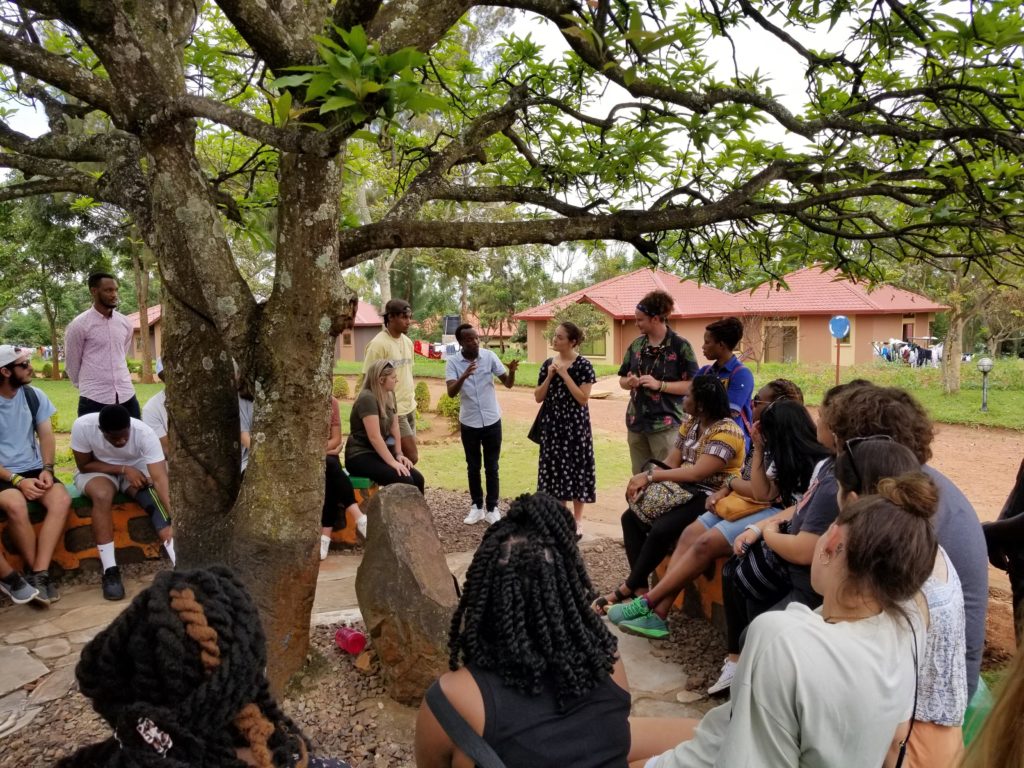
The Mercer team helped the Rwandan participants learn to trust themselves again and re-establish their identities, she said.
Dr. Lane said the training model is deeply personal for him, and he was extremely honored and humbled to see others found value in it and to know it could have a meaningful impact on someone’s life. It was incredible to see the students “blossom” personally and professionally and apply what they’ve learned in their classes to real life.
For many of the students, this was their first time interacting with real clients and leading sessions, Dr. Prioleau said. It was great experiential learning for them as beginning counselors. The work wasn’t easy, and it says a lot about the students that they were willing and eager to facilitate the training.
“It was awesome to not only have the participants share their story, but have the students share pieces of them as well. That made it really special in my eyes,” Dr. Prioleau said. “I can’t tell them enough how proud I was of them. The skills they exhibited, the compassion they exhibited, all of that was important for them to understand the work that we do as counselors.”
Dr. Nelson is interested in providing trauma care for people with limited resources, and the Rwanda trip perfectly aligned with her goals as well as her longtime dream of visiting Africa. The experience has already been of benefit to her in her internship with Grady Behavioral Health. She is more comfortable working with trauma patients and has a better framework for processing it. Dr. Nelson hopes to develop group therapy initiatives in Jamaica after she completes her master’s degree at Mercer in December.
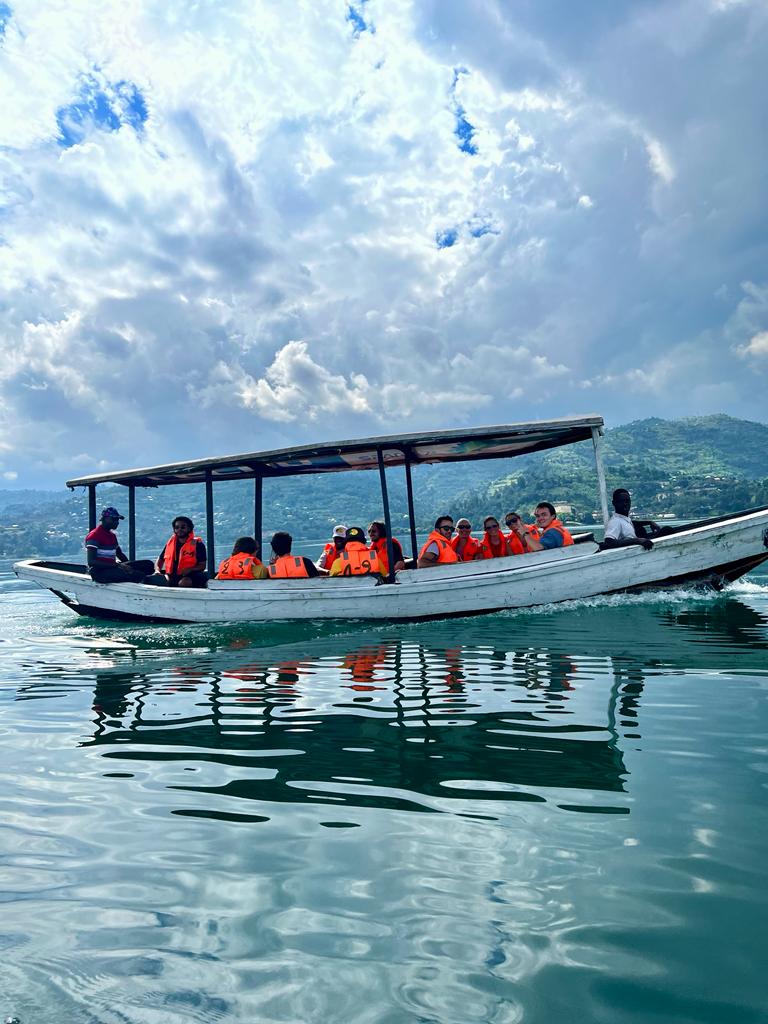
Abby Jones, also a student in the master’s program, said the Mercer On Mission trip combined all the things she’s passionate about: travel, meaningful and sustainable volunteerism, and trauma counseling. She learned so much in just a few weeks and gained a lot of confidence in her abilities to have an impact on others as a counselor.
“This was my first big experience working with trauma counseling,” she said. “It was emotional. It was intense. It was sad. It was scary. But it was also incredibly empowering, beautiful and uplifting. It was the most fulfilling experience of my life. A lot of these people have never shared their story. They really embody survival, empowerment and bravery.”
But it wasn’t all work. Outside the trainings, the Mercer students participated in a variety of activities to give them a better understanding of the Rwandan culture, including touring the Kigali Genocide Memorial.
“It’s one thing to hear about what happened, but to be in a place and see visually what took place, it gave more meaning to what happened in that country and how it impacted its citizens,” Dr. Prioleau said. “Having a global perspective of issues informs us in our practice. It doesn’t matter what the discipline is, having that in your practice is so beneficial.”
The Mercer group also visited Lake Kivu, Ellen DeGeneres’ Gorilla Conservation Campus, coffee washing stations, local markets, a women’s shelter and a youth center; went on a safari; tried local food; and watched cultural dances. Dr. Nelson said the latter was especially impactful for her.
“As they came in and moved in synchrony, I wept,” Dr. Nelson said. “It’s like something awoke in me that I’d never experienced. I was so moved.”
The Rwandan people told the Mercerians that they are now their ambassadors, and charged them with painting a more accurate narrative of their country, she said. Rwandans are deliberate about remembering and commemorating the genocide, but they want others to know that they are so much more than this dark chapter of their history.
